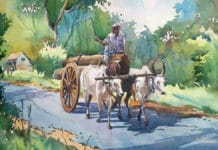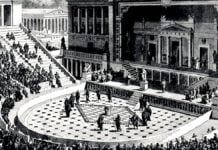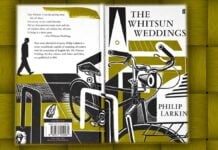An elegy is a mournful, melancholic or plaintive poem, especially a funeral song or a lament for the dead. It is a genre of poetry that expresses sorrow or lamentation, typically for a deceased person. Originating from the Greek word “elegos”, which means a song of lamentation, elegies have evolved over centuries but typically maintain certain core characteristics.
Elegies have an ancient tradition dating back to classical Greek and Roman poets like Theocritus, Catullus, Ovid and Propertius. They were often written in elegiac couplets, a poetic form alternating between lines of dactylic hexameter and pentameter. During the Middle Ages and Renaissance, elegies were less strictly defined by form and more by their thematic content, focusing on love, death, and reflection. In the 17th Century, the form became more flexible, with poets like John Milton, who wrote Lycidas, a pastoral elegy mourning the death of a friend. With the advent of the 19th Century, romantic poets such as Percy Bysshe Shelley and Alfred Lord Tennyson crafted elegies that combined personal loss with broader reflections on life and nature. Modern elegies often diverge from strict forms, using free verse and varied structures to express grief and contemplation. W H Auden’s Funeral Blues and contemporary responses to social and political losses reflect this evolution.
Key Characteristics
- Sombre, meditative tone reflecting on mortality and loss
- Expressions of grief, sadness and mourning for the departed
- Reflections on the life, virtues and accomplishments of the subject
- May address the deceased directly in an apostrophe
- Metaphors equating death to sleep, night, and winter are common
- Consolation for the living by memorialising the dead
- Reflections on the fragility and transience of human life
Theme
The central theme of an elegy is grief and sorrow over the death of a person, often someone close to the speaker. Elegies typically include praise for the deceased, highlighting their virtues, accomplishments, and positive qualities. Many elegies draw parallels between human life and nature, using imagery of seasons, growth, and decay to symbolise the cycle of life and death. The contemplation of death and the speaker’s own mortality is common. While expressing grief, elegies often move towards a sense of consolation or solace for the speaker or others who are mourning.
Elements and Conventions
Elegies frequently use an apostrophe, directly addressing the deceased person as if they were present. Traditional elegies often make allusions to classical mythology, particularly figures associated with death and the underworld. They also often employ natural imagery, such as fading flowers, setting suns, or changing seasons, to symbolise death and the passage of time. The overall tone of an elegy is mournful and reflective, conveying a sense of deep sorrow and loss.
Structure and Form
Elegies do not adhere to a strict form or structure. The traditional form is elegiac couplets, which use alternating lines of hexameter and pentameter. Contemporary elegies often use free verse to allow for more personal expression. They are written in various poetic forms, including free verse, sonnets, or lyrical stanzas.
Traditionally, elegies employed formal and elevated language, reflecting the seriousness of the subject matter. However, modern elegies use more conversational language. Elegies often begin with expressions of grief and lamentation but transform to a more contemplative or hopeful tone towards the end.
Some of the most renowned elegies in English literature include John Milton’s Lycidas, Thomas Gray’s Elegy Written in a Country Churchyard, Alfred Lord Tennyson’s In Memoriam A H H, and Walt Whitman’s elegies for Abraham Lincoln like O Captain! My Captain! and When Lilacs Last in the Dooryard Bloom’d.
Elegy vs. Eulogy
While both deal with death, a eulogy is a speech or writing that praises someone who has died, while an elegy is a poem or song expressing sorrow for their loss.
The elegy allows the poet to work through intense emotions surrounding death while celebrating the life that was lived. Though steeped in sorrow, many elegies end on a consoling or hopeful note about resurrection, immortality or transcendence. The elegy remains a poignant and versatile form of poetry, capturing the depths of human emotion associated with loss while providing a space for reflection and healing. Its evolution from ancient couplets to modern free verse showcases its adaptability and enduring relevance in expressing the universal experience of mourning.





























